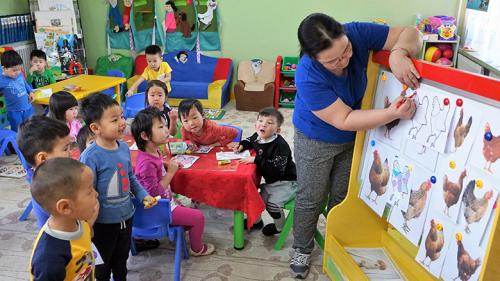New Study Recommends Key Actions to Improve Early Childhood Education in Mongolia
A new World Bank report recommends that Mongolia expand access to preschool services in rural areas, prioritizing home-based early-childhood education for hard-to-reach populations, such as nomadic herders.

The study, on March 29th, launched in Ulaanbaatar, revealed large gaps in school readiness among Mongolian children. But targeted interventions, such as special home-based learning for nomadic families’ children and better learning materials and activities in kindergartens, proved effective in reducing these gaps.
“Investing in early childhood education has long-term benefits for the economy and society in general. Quality education in the earliest years results in better health, less need for social services, lower criminal rates, and increased productivity,” said James Anderson, World Bank Country Manager for Mongolia. “The report launched today has many important findings that will help improve people’s access to, and the quality of, education services that shape Mongolia’s future.”
Mongolia has achieved tremendous gains in improving access to regular and alternative services for early childhood education, with the number of children enrolled more than doubling between 2005 and 2015.
Despite this success, Mongolian children in the greatest need of education – children from rural areas and those from poorer families – have significantly lower access. Among those enrolled in kindergartens, assessments of early development outcomes, including cognitive, language, and social emotional skills, show significant socioeconomic gaps. The largest share of the public subsidy to early childhood education thus accrues to the wealthy.
The gap in school readiness can be remedied. The report shows that increasing family engagement with children through home activities, such as reading, singing and playing together, leads to significantly higher cognitive skills, underlining the potential for a home-based model to improve school readiness among the hard-to-reach populations.
This approach proves far more effective in closing the school readiness gap than existing alternative education services, such as mobile ger-kindergartens for herders, because the short duration of the latter lowers the chances that enrolled children will catch up with peers in kindergarten.
The report also highlights the need to expand kindergarten access in urban areas to include those not enrolled in preschool, while also easing crowding in urban classrooms. But simply enrolling children in kindergarten longer or starting at younger ages will not be enough to shrink the school readiness gap in kindergarten. The report recommends targeted investments to improve kindergarten quality, such as through better financing and the provision of better learning materials and greater variety in classroom activities.
Source: World Bank
- 486 reads
Human Rights
Fostering a More Humane World: The 28th Eurasian Economic Summi

Conscience, Hope, and Action: Keys to Global Peace and Sustainability

Ringing FOWPAL’s Peace Bell for the World:Nobel Peace Prize Laureates’ Visions and Actions

Protecting the World’s Cultural Diversity for a Sustainable Future

Puppet Show I International Friendship Day 2020

